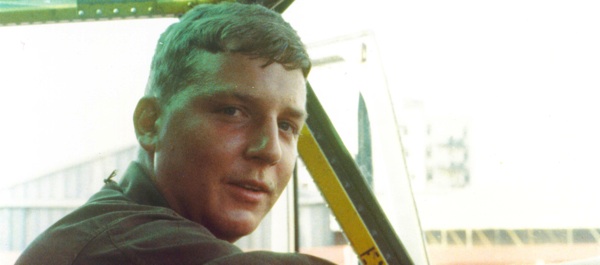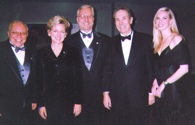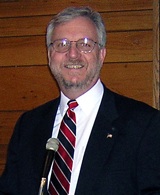
We did one program with a woman who was a nurse in World War II, one who was a nurse in Vietnam, and one had been in Afghanistan.
On a Saturday morning, a man who had been a U.S. Marine Corps sniper in Vietnam is talking on live radio about his experiences. The memories overwhelm him; he starts crying. The man he is talking with, Dale Throneberry, tells him, “That’s all right,” and goes to a break. When the former sniper recovers, the program continues.
Listeners never know what may happen or what they may hear on Veterans Radio, but they know for certain what they hear on the weekly broadcasts from Ann Arbor, Michigan, will be honest and unrehearsed. They may hear interviews with B-17 crewmen, Australian veterans of the Vietnam War, military nurses, well-known authors, controversial figures and a host of others.
Veterans Radio began in 2003 when Throneberry, an insurance salesman, went to see one of his clients, an elderly man with a terminal illness. When Throneberry arrived at the house in the Michigan countryside, the man took him by the arm and said, “Dale, I know you’re a veteran,” and led him to where a 101st Airborne banner was hanging. The man began talking about his wartime experiences. When the two finally went into the man’s house, his wife said, “He’s never told anyone those stories before.” An idea was born.
Today, the live radio program broadcasts each Saturday morning, 9:00 – 10:00 Eastern time, on WDEO Ann Arbor/Detroit and on a handful of other stations in Michigan and the South. Thanks to Internet feeds it has listeners as far away as Tasmania.
On February 9, 2010, founder Dale Throneberry, talked with HistoryNet about the program.
HistoryNet: How did Veterans Radio get started?
Dale Throneberry: Back in 2003 (after his encounter with the 101st Airborne veteran) I was at an insurance meeting and told another salesman, Bob Gould, I wanted to try an idea for a radio program that would tell veterans’ stories. Bob said he wanted to work on it, too. He’s a 101st Airborne veteran.
 We were joined by Gary Lillie, who was in the Seabees in Vietnam in 1966. He’s a great storyteller, an amateur historian and has been involved in veterans programs for 30 years or more. He gets a lot of stories for us. Ken Rogge also came on board. He was with Armed Forces Radio in Thailand during the Vietnam War. Ken isn’t involved with the program now, but he did a lot of tech stuff for us when we were getting started; he archived our stories online. So we were all vets. I was a helicopter pilot in Vietnam, a chief warrant officer.
We were joined by Gary Lillie, who was in the Seabees in Vietnam in 1966. He’s a great storyteller, an amateur historian and has been involved in veterans programs for 30 years or more. He gets a lot of stories for us. Ken Rogge also came on board. He was with Armed Forces Radio in Thailand during the Vietnam War. Ken isn’t involved with the program now, but he did a lot of tech stuff for us when we were getting started; he archived our stories online. So we were all vets. I was a helicopter pilot in Vietnam, a chief warrant officer.
We went on air in November 2003 on a small Country-Western station. It was like in the movie O Brother, Where Art Thou? Every once in a while the antennae would go out, and we’d have to hit it to make it work. But we were able to stream our program through the station’s Internet feed.
From there we went to a larger station, but after it was bought out the new owners decided they didn’t need veterans’ stories anymore, so we moved to the Ava Maria network; we’re the “secular program” on this Catholic station. (The Ave Marie radio network was established by Tom Monaghan, a former Marine who founded the Domino Pizza chain.)
We’d like to get to where we can do satellite programs, but what we’d really like to do is set up a veterans’ radio network with some of the other veterans radio programs that are out there.
HN: Presently, you are on WDEO (990-AM Ann Arbor/Detroit), WMAX (1440-AM, Saginaw), WDEO-FM (99.5 FM, Naples FL), KAGY (1510-AM Port Sulphur/New Orleans LA), KIXW (960-AM, Apple Valley CA) and KMRC (1430-AM Morgan City, LA). Can listeners outside those markets pick it up via the Internet or other means?
DT: We stream live on our Website http://www.veteransradio.net/ from 9 to 10 on Saturday mornings. If you click on veteransradio.net it will take you to the Ave Maria Website where you can listen live. We also have archived programs.
 We have a listener in Tasmania who calls us occasionally. He was a dog handler for Australians during Vietnam. I think he’s listening at 1:00 or 2:00 in the morning.
We have a listener in Tasmania who calls us occasionally. He was a dog handler for Australians during Vietnam. I think he’s listening at 1:00 or 2:00 in the morning.
HN: Americans often forget about the ANZACs in Vietnam.
DT: We did a program on the Aussies, and they said, “You’ve got to do one on New Zealanders. You think we were tough?”
HN: What’s been your favorite or perhaps the most unusual among the programs you’ve aired?
DT: My father was a veteran. He was in the Coast Guard in World War II and served on an LST at Iwo Jima and Okinawa that was hit by a kamikaze. He got a Bronze Star for helping to pull people out of the water, but he died when I was 15 and had never talked about the war. One Saturday, a man called during the program and said, “I knew your father.” So, of course, that show is a favorite for me, but there have been some other really memorable ones.
We asked Max Cleland to come on the show. He’d just lost his Senate campaign and that was very hard on him. He said all the symptoms of PTSD (Post Traumatic Stress Disorder) came back on him.
(Editor’s note: Max Cleland, D–GA, was a triple-amputee Vietnam combat vet. A critic of the George W. Bush administration’s handling of the Iraq War, in 2002 he lost his U.S. Senate seat after one term to Republican Saxby Chambliss in a campaign that included a television ad that morphed Cleland’s face into that of Saddam Hussein and implied he had voted against the proposed Department of Homeland Security, legislation Cleland had actually co-sponsored.)
We talked with Daniel Ellsberg about The Pentagon Papers. That program was well-listened-to. We got a lot of “What are you talking to that guy for?” But I remember reading the PP when I got back from Vietnam and saying, “Wow, they never told us why we are there.”
We try to stay apolitical. In our group we have people on the right, people on the left, people in the middle.
HN: You mentioned there are other veterans’ programs. How does yours differ from those others?
DT: Many of them focus on veterans’ issues and benefits. We like to tell (veterans’) stories. For instance, we have a segment called Medal of Honor that each week tells the story of one person who was awarded the Medal of Honor.
We did one program with a woman who was a nurse in World War II, one who was a nurse in Vietnam, and one had been in Afghanistan.
We’re putting together a series of programs using interviews with a group of veterans over in Bloomfield, Michigan, who served in B-17 bombers. They call themselves The Flyboys. One guy talked about being shot down at 25,000 feet, and when he bailed he forgot to freefall; he just pulled his ripcord. It took him 35 minutes to get to the ground. He was just floating there, watching the war going on below him.
HN: What seem to be the top issues for veterans today?
DT: What is available through the VA (Veterans Administration). The VA just came out with new information related to effects of Agent Orange, for example. Lots of them are hesitant to talk to the VA about issues they may have. Many vets say, “Oh, I didn’t do that much in the war, I don’t deserve that.” Yes they do.
There’s time involved in getting into the VA system, so we’ve talked about how to file a claim, how to get one going. The Vietnam vets are really going out of their way to help these Iraq and Afghanistan vets to understand their benefits and what the VA offers. They take seriously that slogan, “Never again will one generation of veterans abandon another.”
HN: Anything to add?
DT: We have a good program. We try to tell a story as honestly as we can. We just want to extend our audience. All of us who have been in the military have had adventures. Some times we have to talk to others who shared the same experiences and say, “Did I really do that?” Wouldn’t we rather tell our own story than have someone else tell it and mess it up?




